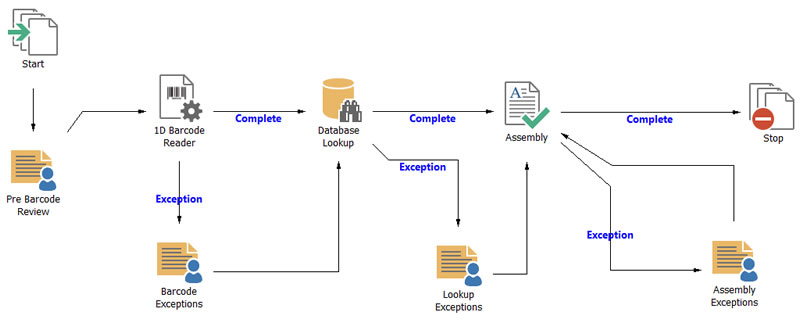
Quillix Document Capture is web-based software that helps organizations acquire, process and organize electronic documents quickly and easily from anywhere in the world. Quillix Users in an organization use the Quillix Web Client to Import electronic documents as files, or Scan paper documents into groups of pages called Batches. Once a batch has been created from electronic files or scanned pages, it may be Indexed either through manual, semi-automatic or automatic processes. The process of indexing produces Documents that are then ready for long-term storage in a document repository.
Quillix Capture provides much more than importing, indexing and storing documents. At it's heart is a powerful business processing engine, capable of making decisions about where batches and documents need to go as they are "flowing" through an organization. Quillix also has a number of very powerful document and image processing components for making documents look better, and for extracting information from documents. These are all part of the Capture Workflow Process working behind the scenes.
Quillix Capture processes are designed and managed by persons in your organization that have been trained to use the Quillix Process Manager application; most likely a system administrator or business process administrator

Figure 1 - Quillix Process Map Example
Quillix Capture lets you import files and scan paper from anywhere in the world using your web browser, and provides an intuitive set of automated and web-based tools to empower users to create meaningful documents and information. The Quillix Web Client provides a rich set of web-based tools for importing, scanning, organizing and indexing documents using assistive technologies and automated processes. Using the Quillix Capture Web Client you can do any of these things based on the permissions assigned to your user login:
The following terms, Queue, Case, Batch Profile and Document Type are used throughout the Quillix Capture product.
Queue
 Quillix Queues are specially designed "lists"
of documents or batches that need to be worked on by a person. As
seen in the process map example above, a workflow process will place items
into a queue based on rules and the flow of the map. Users select
items from queues they have been assigned to in order to perform document
related tasks such as indexing and quality control, or any number of business
related tasks such as document review, customer follow up or other knowledge
work.
Quillix Queues are specially designed "lists"
of documents or batches that need to be worked on by a person. As
seen in the process map example above, a workflow process will place items
into a queue based on rules and the flow of the map. Users select
items from queues they have been assigned to in order to perform document
related tasks such as indexing and quality control, or any number of business
related tasks such as document review, customer follow up or other knowledge
work.
Case
 A Quillix
Case is a container that holds batches and/or documents based on the type
of workflow process the queue belongs to. For Batch Processes, a
case can contain the pages of the batch along with any documents that
have been created in the process. For Document Processes, a case
will contain a single document and its pages.
A Quillix
Case is a container that holds batches and/or documents based on the type
of workflow process the queue belongs to. For Batch Processes, a
case can contain the pages of the batch along with any documents that
have been created in the process. For Document Processes, a case
will contain a single document and its pages.
Batch Profile
 A Batch
Profile defines the workflow process and settings for a batch. A Batch
Profile is specified for a new batch when it is created. The Batch Profiles
available to a user are dependent on their user or group rights as assigned
by an administrator.
A Batch
Profile defines the workflow process and settings for a batch. A Batch
Profile is specified for a new batch when it is created. The Batch Profiles
available to a user are dependent on their user or group rights as assigned
by an administrator.
Document Type
 A Document Type defines the index structure and additional
workflow process for a document. A Document Type is specified for
a new document when it is created. The Document Types available
to a user are dependent on their user or group rights as assigned by an
administrator.
A Document Type defines the index structure and additional
workflow process for a document. A Document Type is specified for
a new document when it is created. The Document Types available
to a user are dependent on their user or group rights as assigned by an
administrator.
Cases, Batches, Documents and Pages are the "things" that you work with within Quillix.
Cases
As mentioned above, a Case is a container. It will "contain" any number of other objects depending on the type of workflow the case is currently in. A Case is also the "thing" that moves through a workflow process, and the thing that you "work" from a queue. Characteristics of a case are:
Batches
A Batch is a collection of unassociated pages and/or document files (PDF, MS-Word, etc.). A batch will most often contain pages acquired from a continuous scanning operation using an auto document feeder (ADF), or a group of files imported at the same time. However, a batch may also contain pages or files added by various people or processes over its lifetime.
Documents
A Document consists of one or more pages or document files arranged in a specific order that all share a common set of index values.
Pages
A Page is a single item in either a Batch or a Document.